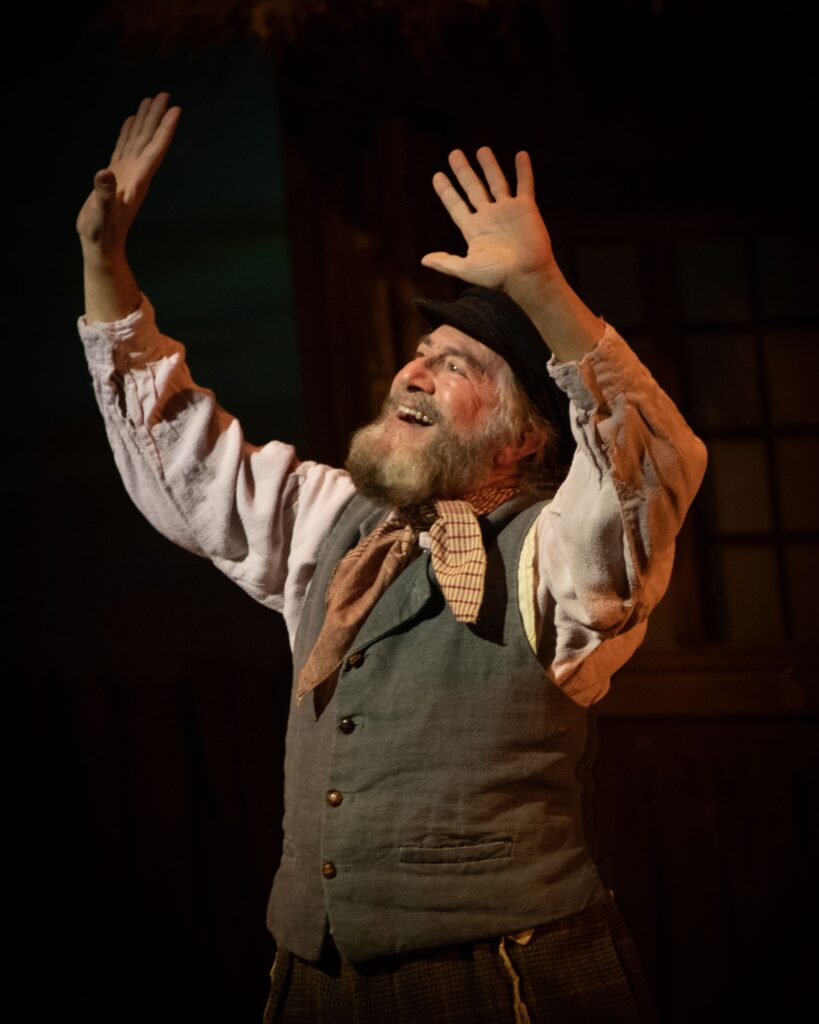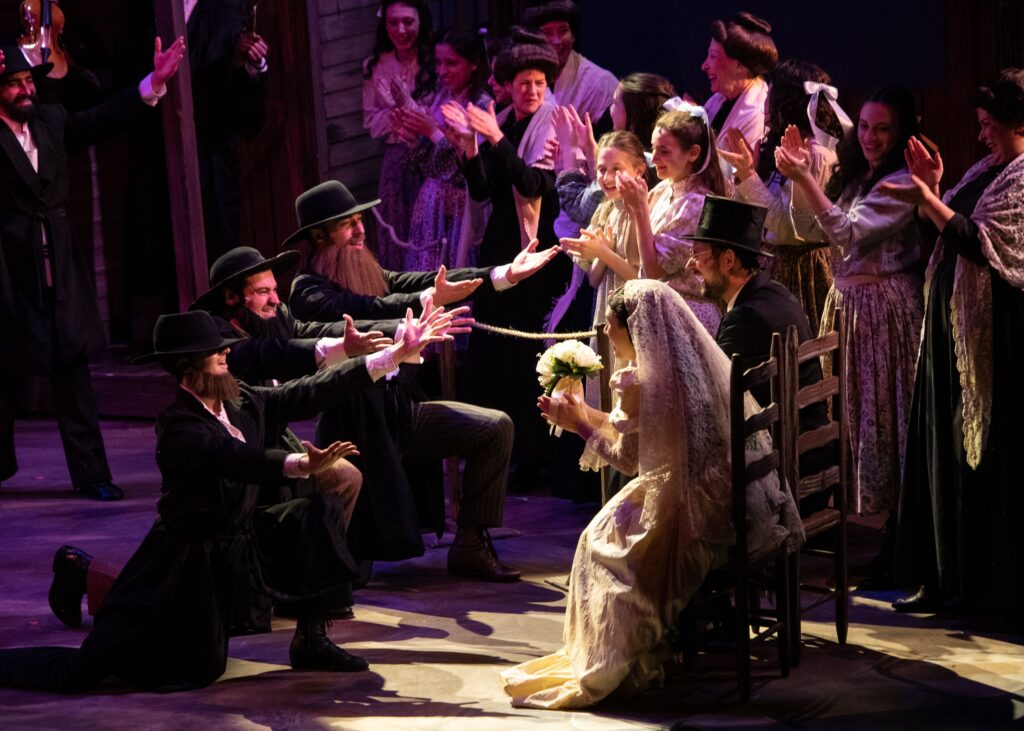
Bruce Sabath exudes the spirit of Tevye in Wick Theatre’s Fiddler on the Roof / All photos by Amy Pasquantonio
By Aaron Krause
With Anti-Semitism so widespread these days, the following line from Fiddler on the Roof feels like a particularly hard punch to the gut: “You are a decent, honest person, even though you are a Jewish dog.“
And in the Wick Theatre’s mostly first-rate production of the classic, beloved show, Troy J. Stanley as the Constable says the latter part of the line to Tevye with enough contempt that we can’t help but feel uncomfortable.
To his credit, Stanley imbues the Constable with enough menace and directness to make us dislike this character. But as much as we may disapprove of the Constable, we can’t help but admire the Wick’s professional production of Fiddler on the Roof. It runs about three hours with a 15-minute intermission and lasts through Feb. 11 at the Wick in Boca Raton.
The Wick has been trying for 10 years to acquire the rights to stage Fiddler. Well, the time has finally arrived. But tickets may be hard to obtain; Fiddler on the Roof is an immensely popular show.
A large, talented cast of performers, several of them recognizable faces from other South Florida theater productions, invests the Wick’s mounting with joy and sadness. That is important because, as the song “Sunrise, Sunset” so eloquently notes, life is, indeed, “laden with happiness and tears.”
True, no births or deaths occur in Fiddler. Still, the show nicely reflects life’s happy and sad times, as well as bittersweet moments. Doubtless, that is part of the reason why the show is so beloved universally. Also, the show sensitively handles themes such as family, community, faith, and tradition (certainly, there is a conflict between holding onto tradition and adapting to change that speaks to us as well).
The characters are easy to pull for because they are recognizable. For instance, you may see your own father in Tevye, your mother in Golde, and your children in one or more of Tevye’s five daughters.
Any quality production of Fiddler needs a strong actor as Tevye. And, fortunately, the Wick’s production boasts a gem of a triple threat performer in Bruce Sabath as Tevye.
South Florida theater audiences may recall witnessing Sabath perform as President Richard Nixon in Frost/Nixon on the Wick’s stage when it was the Caldwell Theatre Company. Elsewhere, Sabath performed in Fiddler on the Roof in Yiddish in New York and performs in his award-nominated one-man show, Searching for Tevye. But while he is no doubt familiar with the part, he delivers a performance blessed with freshness, spontaneity and charisma. Sabath invests Tevye with a nice balance of gravitas and humor to earn the applause showered upon him.
Surprisingly (in a pleasing way) Sabath sings parts of Tevye’s songs in Yiddish. While you might wish for subtitles, this addition to the production lends it an unmistakable authenticity. Ater all, Jews from the “old country” spoke Yiddish, among other languages.
Numerous actors have portrayed Tevye, and they have each put their own stamp on the role. Sabath makes the part his own instead of mimicking performers such as the late Israeli actor Chaim Topol who portrayed Tevye in the multi award-winning 1971 film, winning a Golden Globe award for best actor.
Tevye often talks to God and has a complicated relationship with the Lord. Indeed, at times, Tevye may praise or thank God, while at other times, he criticizes or questions God. Sabath’s Tevye takes this a step further; at one point, he admonishes God by wagging a finger in the direction of the sky and practically scolding the Lord for bringing a misfortune upon him. Wisely, Sabath’s Tevye is also modest and pleasant as he addresses God at other times.
In short, Sabath’s Tevye is a soft-hearted, amiable, funny, charming and charismatic man. Clearly, he adores his wife and daughters and maintains strong convictions. Sure, he can become angry, but Sabath ensures that people remember his Tevye for his positive qualities.
True, in 2024 America, we may not approve of some of Tevye’s beliefs and actions. They include pretending that one of his daughters is dead since she married a non-Jew. But, as you probably know, Tevye (living with his poor family in a small village circa 1905 in Imperial Russia) is slowly adapting to changing times while trying to hold fast to his traditions. It can be a difficult balance to achieve. However, we admire this pious Jewish man for bending (but not breaking) with the changing times.
Sabath boasts a clear, pleasant, and expressive singing voice and deftly conveys the emotions behind the lyrics of the show’s songs.
Sabath and his multi-talented castmates sing with conviction the tone-setting opening number, “Tradition,” while the actor and other performers lend reverence to “Sabbath Prayer.”
The latter is a song that doesn’t move the plot forward but reinforces the serious commitment the villagers make to their faith. Also, Sabath is playful and wishful while singing and dancing to the dreamy number, “If I Were a Rich Man.” In addition, he is sad during the “Chava Sequence,” a song during which Tevye mourns his daughter after she marries a non-Jew. He is joyous while singing the duet, “To Life,” with Lazar Wolf (a sincere Michael H. Small), and modest during “Do You Love Me,” a duet with Golde (a terrific Patti Gardner).

Patti Gardner’s Golde melds with Bruce Sabath’s Tevye
Gardner makes Golde a strong-willed woman with a dry wit who can be sarcastic and speak in a deadpan tone. Gardner also projects a weariness that makes sense. After all, she and her husband have lived a hard life, struggling to feed such a large family and hold fast to traditions in a changing world. But Gardner also infuses Golde with joy and hope during happy times. Gardner, an award-winning South Florida performer, brings the requisite reverence to “Sabbath Prayer,” while sincerely singing other numbers such as “Do You Love Me?”
Gardner demonstrates strong chemistry not only with Golde’s husband, but with her friend, Yente the Matchmaker. Rachel Matz Hunter plays Yente comically with a sing-songy voice and an air of forgetfulness. Also, Hunter makes Yente a positive, happy-go-lucky person who seems to take things in stride. We adore her because we recognize Yente in others — perhaps even our own sometimes forgetful and humorous grandmother.
Meanwhile, perhaps we see our kindly grandfather or uncle in Small’s Lazar Wolf, an elderly and lonely butcher and widower. Small projects modesty. Also, he is believably and understandably irritated at Tevye during Tzeitel and the tailor Motel Kamzoil’s wedding.
Small, like Sabath, radiates joy during the upbeat number, “To Life.” However, Small could inject Wolf with a stronger sense of purpose when he asks Tevye for permission to marry the dairyman’s eldest, Tzeitel (a passionate Torie D’Alessandro). In the 1971 film musical version of Fiddler, the actors portraying Tevye and Wolf perfectly played the scene. Namely, Paul Mann conveyed believable hope, his face expectant as Tevye thought about whether to grant him permission to marry Tzeitel.
Speaking of Tevye’s eldest, D’Alessandro, as a pleading Tzeitel, is convincingly desperate after Tevye informs her that she will marry Wolf. D’Alessandro also shines while singing “Matchmaker, Matchmaker” with fellow cast members who play Tevye’s other daughters. Specifically, they are hopeful and playful during the number. They sing the song while pretending to ask a matchmaker to hook them up with a husband.
Mallory Newbrough plays Hodel while Caila Katz brings Chava to life. Other performers alternate in the roles of Tevye’s younger daughters.While Newbrough is mostly strong as Hodel, she could convey more determination when she sings to her father that she “must go” and be with the revolutionary student, Perchik in Siberia.
Alex Martinez delivers one of the strongest performances as an outspoken and fiercely determined Perchik. You sense in him a palpable spirit of advocacy, like many young people today. Martinez also conveys credible satisfaction and happiness during the song “Now I Have Everything.”
Michael Scott Ross, as Motel, conveys almost unrestrained happiness during the lively number, “Miracle of Miracles.” It comes after Tevye grants permission for Tzeitel and Motel to marry. Ross is also believably nervous, sincere, and friendly as the insecure Motel. Frankly, he is a bit of a nebbish. But as the production progresses, Ross’s Motel seamlessly grows more confident.
While the leads are terrific, the supporting cast also excels. They help bring a sense of community to circa 1905 Anatevka, on the eve of the Russian Revolutionary period. Among the standout supporting actors are Giorgio Volpe as the Fiddler, who plays his instrument flawlessly. This character is the first one we see at the beginning of the show. During the reviewed performance, the audience applauded at the mere sight of him. The musical’s title comes from Tevye’s description of the man. Without their traditions, the villagers’ lives would be as shaky as a fiddler on the roof.
The supporting cast includes Cameron Edris as a pleasant Fyedka, the non-Jew who marries Chava (an innocent Caila Katz). David Nagy makes a pious rabbi and Melissa Goldberg crazily portrays the deceased Frumah Sarah, Lazar Wolf’s wife. She comes back to life during the dream sequence, during which Tevye pretends to have a nightmare.
There is an otherworldly aura during this scene, accentuated by lighting designer Clifford Spulock’s non-realistic lighting. He uses hues such as red and green, as well as dimmed lighting during moments when Tevye ponders something. Bright, realistic lighting bathes the stage during more upbeat moments. The lighting also nicely focuses individual performers.
Cast members, who sing with recorded accompaniment, also dance with verve. Under choreographer Robert J. Abdoo’s guidance, the cast spins, dances, and moves in circles, which perhaps symbolize the life cycle. Among the several dances, perhaps the most impressive one is the bottle dance. “The bottles on the heads of the dancers in the wedding celebration are not glued, velcroed, or attached in any way,” production director Norb Joerder writes in the program. “They are held there just by balance.” Amazing.
Joerder, who is no stranger to Fiddler on the Roof, directs this production sensitively and with attention to detail. For instance, Joerder and the cast make good use of pauses. This helps the cast demonstrate deft comic timing.
The cast sings, dances, and acts on sets designed by an uncredited artist or artists. For the most part, the sets are modest. For instance, we see inside a stand-alone structure which stands for Tevye’s house and Motel’s sewing shop.
Ann M. Bruskiewitz designed the costumes, some of which are symbolic. For instance, Tevye and his wife wear white while in bed during the dream sequence. It’s a ghostly dream, so white is appropriate. Costumes that are black and white might symbolize life’s various moments – some happy, some sad.
Kacey D. Koploff designed the projections. In addition to depicting homes that make up the village, the projections illustrate the sky, complete with a moon, clouds and stars. The starry night sky depiction adds a romantic, elegant touch to the wedding scene. Yet somehow, the projections showing the sky seem inappropriate for other scenes. Frankly, they look like they belong more in plays such as It’s a Wonderful Life.
Fiddler’s ending is bittersweet; true, authorities force the villagers to leave Anatevka, and they may never see each other again. Yet, we know that the characters are headed to places where opportunities await them, such as America.
“Next Year in Jerusalem,” Yente yells out toward the end. And during the reviewed performance, the audience chimed in. Indeed, this production is so vibrant and believable, you want to participate. And, just like the villagers in 1905 Russia, we, in 2024 America, hope for better times ahead during these uncertain days.
The Wick Theatre’s production of Fiddler on the Roof continues through Feb. 11. at 7901 N. Federal Highway in Boca Raton. For tickets, go to https://thewicktheatre.thundertix.com/events/210732. Or call (561) 995-2333 or go to https://thewick.org. Up next at The Wick is the classic musical Carousel. It will run from Feb. 29-March 24.










 A PaperStreet Web Design
A PaperStreet Web Design
